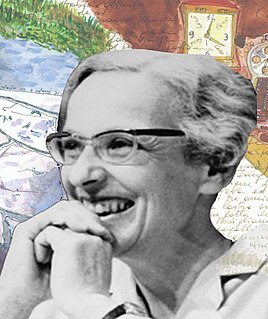A Quote by Jean Piaget
The essential functions of the mind consist in understanding and in inventing, in other words, in building up structures by structuring reality.
Related Quotes
Scientists often invent words to fill the holes in their understanding.These words are meant as conveniences until real understanding can be found. ... Words such as dimension and field and infinity ... are not descriptions of reality, yet we accept them as such because everyone is sure someone else knows what the words mean.
If you use your mind to study reality, you won't understand either your mind or reality. If you study reality without using your mind, you'll understand both. . . . The mind and the world are opposites, and vision arises where they meet. When your mind doesn't stir inside, the world doesn't arise outside. When the world and the mind are both transparent, this is true vision. And such understanding is true understanding.
Modern writing at its worst does not consist in picking out words for the sake of their meaning and inventing images in order to make the meaning clearer. It consists in gumming together long strips of words which have already been set in order by someone else, and making the results presentable by sheer humbug. The attraction of this way of writing is that it is easy.
I'm a filmmaker, but my working procedures are different. All my basic structuring is done during the filming. You know, how long I keep the shot, the exposure or the speed - slower or faster, etc. That's structuring. And then there is a second stage of structuring that comes later when I begin to put those pieces together.
Number, as it were, lies behind the psychic realm as a dynamic ordering principle, the primal element of which Jung called spirit. As an archetype, number becomes not only a psychic factor, but more generally, a world-structuring factor. In other words, numbers point to a background reality in which psyche and matter are no longer distinguishable.
I think the structures of exclusion are more systematically built up in American society, for example, so that young girls interested in science eventually lose their confidence over time. The structures of exclusion work against them. We have other structures of exclusion in India, but not around modern scientific knowledge.
As words are not the things we speak about, and structure is the only link between them, structure becomes the only content of knowledge. If we gamble on verbal structures that have no observable empirical structures, such gambling can never give us any structural information about the world. Therefore such verbal structures are structurally obsolete, and if we believe in them, they induce delusions or other semantic disturbances.
The proper education of the young does not consist in stuffing their heads with a mass of words, sentences, and ideas dragged together out of various authors, but in opening up their understanding to the outer world, so that a living stream may flow from their own minds, just as leaves, flowers, and fruit spring from the bud on a tree.
Semantics is about the relation of words to thoughts, but it also about the relation of words to other human concerns. Semantics is about the relation of words to reality - the way that speakers commit themselves to a shared understanding of the truth, and the way their thoughts are anchored to things and situations in the world.






































